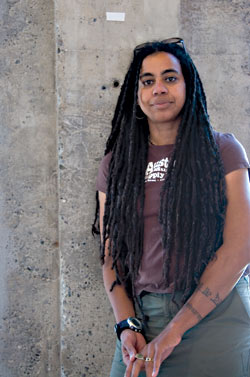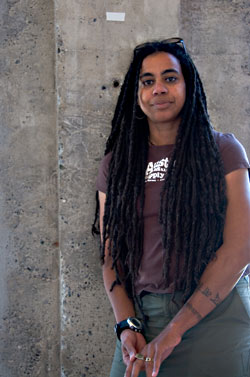Fast and funny, ArtsWest’s production of La Bête is far more than simple farce. David Hirson’s play, under Walter Baker’s direction, is a celebration of art in its many forms—from the lowest joke to the loftiest prose. Written in the style of Molière and set in a fictional and relevantly modernized 17th-century France, La Bête tells the story of a theatre troupe ordered by their patron, Prince Conti (Gavin Cummins), to accept the addition to their ranks of an intensely irritating and self-important street performer.
Resolutely opposed to compromising her art to complacently guarantee her troupe’s livelihood, writer Elomire (Beth A. Cooper) squares off against Valere (Nick DeSantis), who in no less than three minutes clearly illustrates, by sheer power of ego, why Elomire finds him completely insufferable. DeSantis displays considerable stamina in his role, unfalteringly firing off a fabulous 30-minute monologue in unobtrusive rhyming couplets while prancing about stage in a shimmering doublet and green Converse high-tops, lisping, blushing, and entirely caught up in a fantasy of grandeur.
The material is, without question, excellent. Hirson’s first play, La Bête has earned five Tony Award nominations, six Drama Desk Awards, and the Laurence Olivier Award for Best Comedy of the Year. ArtsWest’s cast doesn’t disappoint. From the central characters’ passionate beliefs of the nature of art, to the transparent ambitions of Elomire’s players, to the mysterious complexity of the lowly servant girl Doreen (Frannie Morriston), they make us believe as strongly as they do that art is a force to be reckoned with.
For such a humorous play, La Bête poses seriously poignant questions about the place of art in society. It’s a refreshingly witty examination of how those who control funding for the arts (and increasingly, for arts education) can determine the definitions of artistic excellence and mediocrity. La Bête lends a good deal of credibility to Elomire’s unwavering ideals, but finally acquiesces that even what we call “bad” art has its steadfast devotees for good reason.







